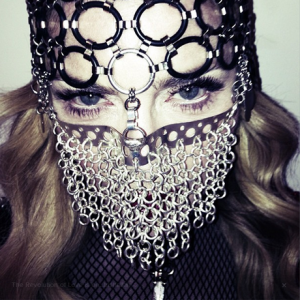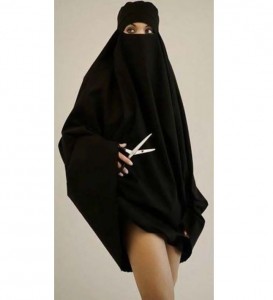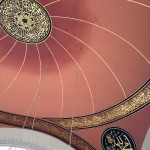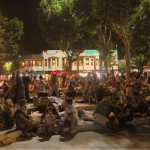Ramadan Mubarak everyone!
For many years now, Muslimah Media Watch has worked hard to problematize, counter, question and critique depictions of Muslim women in a variety of media outlets, as a way to provide new perspectives to looking at the “Muslim woman problem” (starting by questioning this statement).
Since Ramadan 2013 has arrived, I would like to first wish you all a wonderful and blessed month. During this month, I am hoping my fellow MMW writers will have a break from horrid portrayals of Muslim women both in many mainstream media sources and in some Muslim communities. With Muslims immersed in the spiritual and cultural practices of Ramadan and everything else that is happening in the world (from sexual attacks on female protestors in Egypt to halal nail polish and Iranian officials refusing to recognize Elham Ashgari’s swimming record), I think it is important to reconsider the ways in which we speak about Muslim women.
So, I have come up with some suggestions, along the lines of Ramadan resolutions – that I would like other people to follow.

Tip #1: Enough with the Hijab!
It is Ramadan, and stories of “Ramadan hijabis” have started to flourish. I am hoping we won’t see any more of those sexist-hijab-focused memes that wood turtle recently wrote about. I am looking forward to finding alternative ways to welcome young Muslim women to the Ramadan experience other than hijab tutorials (recently critiqued by Izzie) and mosque lectures on the “woman as a pearl” analogy (which was the topic of the first Ramadan lecture in my mosque last year).
Tip #2: Get over it! We don’t need saving.
After all the FEMEN fuss (which we covered here and here), I am already expecting the group to show up topless to an iftar or Eid prayer somewhere… However, they are not the only ones who are out to save us. From politicians to Madonna and Iron Man (the latest movie was reviewed by wood turtle), Muslim women are seen as needing to be freed …Well, I would appreciate a month without saving, and it would be much better if people around the world could recognize Muslim women’s agency and local efforts to improve their opportunities, rights and status.

Tip #3: Acknowledge race, culture and privilege.
It may come as a surprise, but Muslim women are not a monolithic group that can be easily lumped into one category. The mainstream media is well-known for extrapolating their assumptions on Muslim women based on countries with “bad” reputations like Iran or Saudi Arabia. Yet, we do the same within Muslim communities. We preach equality but point at other Muslim groups when there is something we do not like (female circumcision anyone?)I belong to a predominantly Arab Muslim community where black abayas and hijabs are expected, the Arabic language is praised and pushed on everyone else, and Arab standards of beauty apply. There is little acknowledgement of South Asian and African communities, and racism prevails. Fair-skinned Arab women rank first in beauty lists, followed by white converts.
We talk about racial equality in the mosque, but the reality is completely different, as explored by Amina in a recent post. So, this Ramadan we should be looking at our own biases and privileges.
Tip #4: Get out of our bedrooms.

With the arrival of Ramadan I often hear non-Muslims going on and on about Muslims not having sex during the day (in northern Canada is about 18-19 hours) and Muslims providing explanations about their sex life. Particularly, there seems to be an unnatural curiosity about Muslim women’s sex lives. In recent months we have also seen an increase of media coverage on the intimate lives of Muslim women; from what they do in their bedroom to what they really like and enjoy. Shireen recently wrote a piece discussing media obsessions with this, and some answers provided by Muslim women. But to be honest… while I welcome Muslims’ questions and inquiries about worship and sex and I am happy to read and hear Muslim women’s stories exploring sexuality, I would really appreciate people not questioning, criticizing and mocking what we do (or don’t do) in our bedrooms in Ramadan (or ever).
Tip #5: Respect each Muslim woman’s worship.
I have had my share of lectures and conversations that make it sound really bad to be a Muslim woman in Ramadan, from people chasing after women that do not wear hijab and warning us against “tempting the brothers” to the struggles we face to explain ourselves to non-Muslims during the month. It can be a lot of pressure to be a Muslim woman when it comes to Ramadan. However, I believe that the different ways in which Muslim women observe Ramadan should be appreciated. These might not include the clothing obsession or the modesty-for-the-sake-of-the-brothers speech. In fact, the posts from last year’s Ramadan series at MMW are a portrayal of the different ways in which a group of diverse Muslim women observe and experience Ramadan. Personally, I see in this diversity the key to the spiritual state that we are looking for during this time.
Tip #6: Appreciate the Journey.
Whether you are a Muslim or a non-Muslim, it is important to recognize that for many Muslims Islam is a journey. And just like any journey it is full of excitement, challenges, trouble, spirituality and joy. Ramadan is the peak of a cycle within the journey and it is, for some of us, a time of renewal. When it comes to Muslim women the journey is sometimes attached to experiences with the hijab (or lack of it), motherhood, marriage, professional careers, academic achievement, activism and, above all, spiritual connection to God. This journey is to be appreciated for what it is whether you agree with it or not.
And after this long list, once more, I wish everyone a great Ramadan, full of spiritual fulfillment and happiness. Ramadan Mubarak!
For more on MMW’s Ramadan series, and to read the rest of this year’s Ramadan posts, click here.















